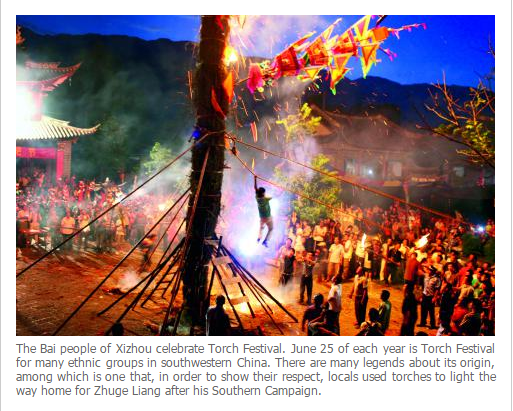History of Xizhou Old Town in Dali
An Ethnic Melting Pot
The builders of the Dongyuan compound, the wealthy Dong merchant family, were of the Bai ethnicity; yet, why did their family bear a Han name like Dong? The story is almost as old as the Bai ethnicity itself.

According to The Chronicles of Huayang, a written account of ancient southwestern China’s history, geography and people, written by the 4th-century historian Chang Qu, ancient Jianning County, the ancient Zhaotong region and ancient Yongchang County (which are all located in modern Yunnan Province) were inhabited by minorities, yet most of the inhabitants had Han names. In 225 AD (during the Three Kingdom’s Era 220–280 AD), Chancellor Zhuge Liang of the Shu Kingdom (221–263 AD) put down an armed rebellion in the kingdom’s south, in what history would come to call “Zhuge Liang’s Southern Campaign.” Following the Campaign, Zhuge Liang enforced a policy of “allocating minorities to big families of Han Chinese, leading to a wide scale adoption of Han names by minority ethnicities. Yet Zhuge Liang’s policy did not lead to a complete Han Sinification in the Yunnan region; instead, the blending of these two cultures led to the creation of an entirely new ethnicity: the Bai.
By the Tang Dynasty (618–907), people had once again shifted their gaze towards Yunnan, where they discovered the “Xi’er River Barbarians.” (Xi’er is a river in Yunnan that flows from Erhai Lake.) In the era after Zhuge Liang, the local people enjoyed a paradisiacal life and, although they retained some characteristics of Han culture, they developed into a civilization entirely distinct from that of China’s central plains, leading the people of the central plains to refer to them as “river barbarians.”
With the backing of the Tang Dynasty, the Yunnan region’s Nanzhao tribe conquered other surrounding tribes, and the river barbarians, to establish the Nanzhao Kingdom (798–937). In 937, the Bai overthrew Nanzhao and established the Dali Kingdom, with modern-day Xizhou at its center.
The Dong family was one of the pillars of the Dali Kingdom’s rule, so it was this “Great River Barbarian Family” that led to Xizhou’s inextricable link with the Bai people. Yet there were problems with the Dong family’s genealogy.
As historian Zhao Shiyu uncovered, the Late Qing-era genealogy of the Dong family of Xizhou includes a note that “the founder of the Dong family, Dong Jiu, was of Nanjing and moved to Tengchong (a county in Yunnan) during the final years of the Ming Hongwu Emperor’s reign.” Zhao Shiyu’s research indicates that Dong Jiu was actually a local bureaucrat in Yunnan during Hongwu’s reign (which lasted from 1368–1398) and that he assisted the Ming Dynasty (1368–1644) in its Luchuan-Pingmian Wars aimed at pacifying Yunnan. Generations of Dong family members ceaselessly proclaimed their local, aboriginal identity in order to maintain their legitimacy as regional rulers.
Yet, in the wake of the Qing Dynasty’s reform for the “abolition of the local chieftain system,” which began in the mid-to-late stages of the Ming Dynasty and strove to abolish traditional chieftains who lead local minority ethnic groups. The court replaced the chieftains with officials dispatched by the central government; therefore, the Dong family lost its traditional claims to rule. After this, the family attempted to maintain its dominance over local governance through the imperial examination system and Dong Jiu’s ethnic identity was retroactively downplayed to the point where, by the end of the Qing Dynasty, he had become a “person from Nanjing.” The family had gone so far as to alter their geological history to claim that their ancestors had descended from Huan Longshi, an official in the court of the Shun Emperor, China’s mythical tribe leader in remote ancient times, to maintain the legitimacy of their identity.
When all was said and done, is the Dong family Han or Bai? In actuality, it makes no difference; the family is at once Han and Bai. Xizhou is a land where Han and Bai cultures are blended and, over the course of its history, the people of Xizhou have come to value cultural identity far more than ethnicity.














